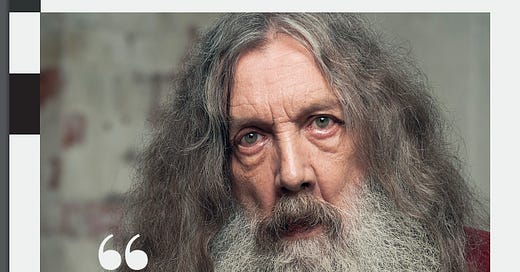Hello ‘stackers, I know I don’t post that often, but just like my approach to making comics, I like to take my time and work on fewer projects in order to maximize my concentration and to deliver as best I can. Today, I came across some wisdom that I knew I wanted to capture here and share with the writing community.
After seeing several ads for an online course on storytelling by the great Alan Moore, I finally pulled the trigger on the self-paced class, offered by BBC Maestro for $90. It is broken down into very digestible chapters, ranging from 5-10 minutes each, more or less, totaling 33 chapters hosted by the one-and-only Moore. Here’s the link:
BBC Maestro presents: Alan Moore on storytelling
One of the early lessons is labeled the Four Weapons. I couldn’t wait to dig into this video because the name alone seemed so very Mooreian. He identifies as an anarchist and his approach to the world comes through the lens of alchemy and magic. In his own words, writing is a way to enchant and even change human consciousness. As a writer, much like a magician, he offers that you need four weapons:
Coins/discs = representing Earth and the physical world
Swords = representing air, or human intellect
Cups = representing water, or emotion and compassion
Wand = representing fire, or a human’s will and spark
So, indeed the four weapons are earth, wind, water, and fire. Let’s dig a little deeper.
With the physical world, Moore recommends you learn how things work and how people work. He urges you to learn about sociology, physics and history and gives an example that if you want to write a story that is a medical drama, you must learn all you can about modern medicine, healthcare and how hospitals work. It makes sense. I call this background research, where you can build your knowledge and come off as credible as a creator and narrator in any given genre.
With human intellect, the gray wizard says you must develop a very sharp edge for good ideas versus bad ideas as you shape and craft your themes and storylines. His take is that you must stand for something as a writer and you have to have a firm sense for your personal moral compass and politics, whatever they may be. From this knowledge of self, a writer can have a clear voice and stance on the real world and the fictional worlds they create.
With emotion and compassion, a writer can empathize with the characters they birth. In particular, villains must be well fleshed out, because you understand where they come from and why they are they way they are. It’s been said elsewhere: villains are the heroes of their own stories. Think about Emperor Palpatine. His end goal was peace, even if his means were dark and twisted… but you must know him inside and out before you write him, or else he comes across too flimsy and one-dimensional.
With human will and desire, he says this weapon directs the other three. He told a very personal story of being a fearful writer his first year, not finishing anything he started and not submitting anything for review. One day, he took matters into his own hands and decided no one would help him become a writer… but also that no one would be blocking him or preventing him from reaching his goal. Let me just say that is the mother-lovin’ truth right there! Bravo to Moore for coming to this conclusion in his twenties, as opposed to me — I came to this epiphany in my thirties. But such is life, Moore a full-time writer, and me, a part-time writer doing the side hustle. Either way, it requires a headstrong attitude with no room for quitting or fear of being judged.
At the end of the day, Moore says you have to manifest your stories and will them into existence… into that physical world you’ve studied on the way to becoming a writer with passion and intellect. Four weapons indeed.
Stay sharp, friends!






The link has been fixed, as well as a typo - thanks for supporting this work in progress of a blog!